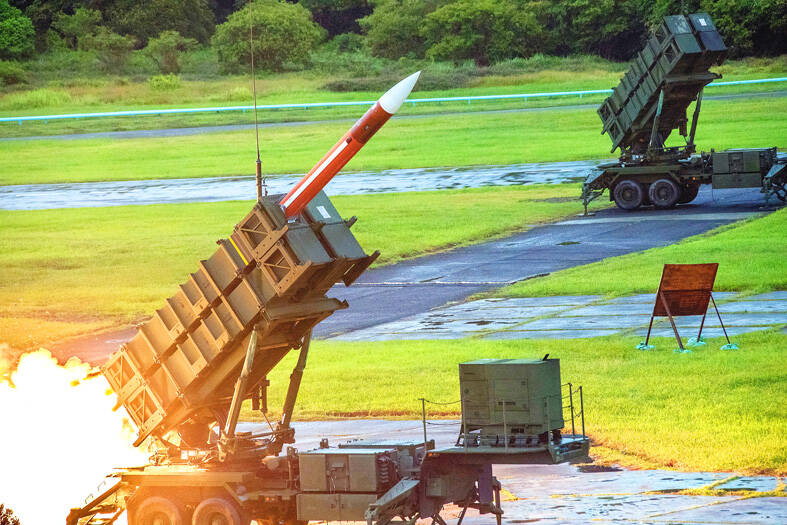Taiwan should maintain its existing conventional forces to combat low-intensity conflicts while acquiring more asymmetric warfare capabilities to counter potential aggression from China, said a report by military analyst Eric Gomez published by the Cato Institute on Friday last week.
The report compared military items sold to Taiwan during US president-elect Donald Trump’s first term in office and US President Joe Biden’s current term.
Trump sold more traditional weapons while Biden emphasized improving asymmetric warfare capabilities, the report said.

Photo courtesy of Ministry of National Defense via CNA
The first Trump administration sold Taiwan US$10.4 billion (NT$319.9 million) in traditional weapons, while the Biden administration has only sold US$500 million worth of traditional weapons, the report said.
“Traditional weapons are more flexible, but they tend to have much higher unit and lifetime costs and take longer to build than asymmetric capabilities,” the report said.
As of last month, only one of four military sales packages made by the Trump administration has been delivered to Taiwan, it said.
Initial deliveries of M1 Abrams tanks and F-16 jets should begin in the next few months and be completed within two years, it added.
The Biden administration focused more on asymmetric capabilities, with nine sales packages worth a total of US$4.36 billion, and maintenance, with 14 sales packages worth a total of US$2.81 billion, the report said.
Acquiring more asymmetric capabilities while maintaining existing traditional capabilities is a “sensible strategy,” he said.
“While the first Trump administration sold Taiwan more weapons, the Biden administration sold Taiwan a better mix of weapons for Taiwan’s self-defense needs,” Gomez said.
A recent report by the Financial Times said that Taiwan might put forward a large arms sales wish list worth US$15 billion for surface warships, F-35 fighter jets, E-2D early warning aircraft and Patriot interceptors, he said.
Except for the Patriot interceptors, “this would be a terrible choice for Taiwan,” Gomez said.
Not only would these traditional systems consume most of Taiwan’s limited defense budget, but “they would be relatively easy for China to counter and take a long time to be built and delivered,” he said.
Taiwan has correctly started focusing more on the development of much-needed asymmetric warfare capabilities in the last few years, he said.
While large-scale arms sales might seem appealing, it is more rational for the shared interests of both nations for Taiwan to buy cheaper, but more militarily effective asymmetric capabilities, he added.

Alain Robert, known as the "French Spider-Man," praised Alex Honnold as exceptionally well-prepared after the US climber completed a free solo ascent of Taipei 101 yesterday. Robert said Honnold's ascent of the 508m-tall skyscraper in just more than one-and-a-half hours without using safety ropes or equipment was a remarkable achievement. "This is my life," he said in an interview conducted in French, adding that he liked the feeling of being "on the edge of danger." The 63-year-old Frenchman climbed Taipei 101 using ropes in December 2004, taking about four hours to reach the top. On a one-to-10 scale of difficulty, Robert said Taipei 101

Nipah virus infection is to be officially listed as a category 5 notifiable infectious disease in Taiwan in March, while clinical treatment guidelines are being formulated, the Centers for Disease Control (CDC) said yesterday. With Nipah infections being reported in other countries and considering its relatively high fatality rate, the centers on Jan. 16 announced that it would be listed as a notifiable infectious disease to bolster the nation’s systematic early warning system and increase public awareness, the CDC said. Bangladesh reported four fatal cases last year in separate districts, with three linked to raw date palm sap consumption, CDC Epidemic Intelligence

Two Taiwanese prosecutors were questioned by Chinese security personnel at their hotel during a trip to China’s Henan Province this month, the Mainland Affairs Council (MAC) said yesterday. The officers had personal information on the prosecutors, including “when they were assigned to their posts, their work locations and job titles,” MAC Deputy Minister and spokesman Liang Wen-chieh (梁文傑) said. On top of asking about their agencies and positions, the officers also questioned the prosecutors about the Cross-Strait Joint Crime-Fighting and Judicial Mutual Assistance Agreement, a pact that serves as the framework for Taiwan-China cooperation on combating crime and providing judicial assistance, Liang

US climber Alex Honnold left Taiwan this morning a day after completing a free-solo ascent of Taipei 101, a feat that drew cheers from onlookers and gained widespread international attention. Honnold yesterday scaled the 101-story skyscraper without a rope or safety harness. The climb — the highest urban free-solo ascent ever attempted — took just more than 90 minutes and was streamed live on Netflix. It was covered by major international news outlets including CNN, the New York Times, the Guardian and the Wall Street Journal. As Honnold prepared to leave Taiwan today, he attracted a crowd when he and his wife, Sanni,